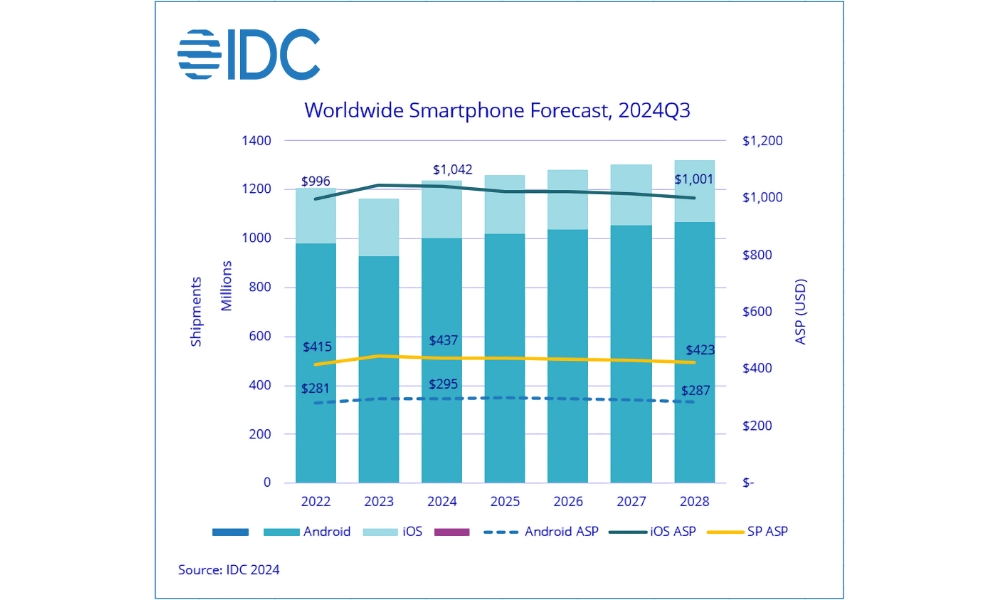Android Sales Are Outpacing the iPhone — But Not Because of AI
 Credit: katjen / Shutterstock
Credit: katjen / Shutterstock
Toggle Dark Mode
For the past year or so, we’ve heard pundits predicting that generative AI would lead to a boom in sales as new customers eagerly upgrade to get their hands on the latest artificial intelligence capabilities. If the analysts were to be believed, Apple Intelligence would boost iPhone 16 sales, and Gemini Live and Galaxy AI would do the same for the Android world.
Well, it turns out that the average consumer may not be as excited about artificial intelligence features as those in the tech bubble anticipated.
A new analyst by IDC reveals that Android smartphone sales are indeed growing while iPhone sales remain relatively flat — to the tune of a predicted 6.2% increase for Android year-over-year versus 0.4% for the iPhone.
While some may jump to the conclusion that the late arrival of Apple Intelligence has played a part in slagging iPhone sales, the reality speaks to a far more basic instinct: price.
Firstly, Android smartphone shipments have been declining over the past two years. That’s created a fertile market for device upgrades as more people find themselves stuck with aging smartphone that won’t run the latest Android releases. While Android makers like Google and Samsung have begun offering seven years of major updates, those only apply to their latest phones. It was much more common 2–3 years ago to find manufacturers promising two years at best, which means the clock is starting to run out for many of those.
For this reason, this year’s Android growth represents a bubble that won’t last. IDC notes that “growth is expected to slow to low single digits from 2025 onward,” which makes sense as those who buy new smartphones this year are likely to stick with them for even longer. After all, both smartphone platforms have hit a plateau where there’s not nearly as much room for growth in performance and capabilities. An iPhone 12 performs just as well as today’s iPhone 16 in everyday use, which means fewer users have an incentive to upgrade.
However, it’s also important to note that it isn’t the flagship Android phones with the latest AI features that are driving this growth. The majority of it is coming from the lower-end market that Apple doesn’t compete in. As IDC notes:
Rapid Android growth of 7.6% year-over-year focused in APeJC, Latin America, Middle East and Africa and China, primarily in low end devices, is pivotal to the 6.2% growth this year. In contrast, iOS is expected to grow a modest 0.4% in 2024.
In fact, IDC is quite clear that generative AI has “yet to impact demand significantly and drive early upgrades,” according to senior research director Nabila Popal. It’s unlikely that Apple Intelligence would have moved the needle significantly on iPhone 16 sales (which are doing fine) even if it had been fully available for a day one launch.
While we continue to believe GenAI will revolutionize the user experience in the years to come, more investments are needed to increase consumer awareness and introduce a ‘must have’ feature that will rush consumers to the store and create that super cycle which everyone is waiting for.Nabila Popal, IDC senior research director
The same holds true for foldable phone models, which IDC research director Anthony Scarsella says “continue to grab headlines despite the low volumes in the market.” They’re shiny, and they’re cool to look at, but nobody is really buying them; IDC says foldables declined by 7.4% last quarter even as “the world’s most prominent vendors” — Samsung and Motorola — launched new models. In that context, it’s easy to understand why Apple isn’t in a huge rush to release a foldable iPhone.
Meanwhile, the script is expected to flip next year, when IDC predicts that iOS will grow by 3.1% versus 1.7% for Android. By that point, Android upgrades will have stabilized from this year’s boom and there will be some pent-up demand for iPhone upgrades to take its place — either late upgrades to iPhone 16 models (not everyone buys a new iPhone on launch day), or the new iPhone 17 lineup when it arrives next fall.








